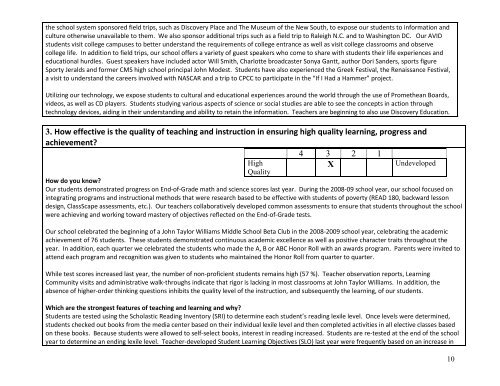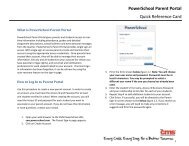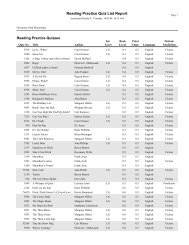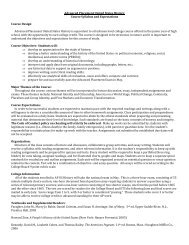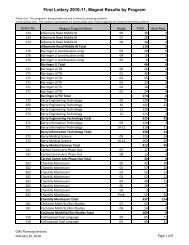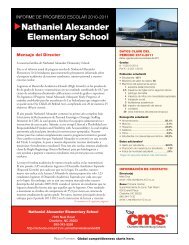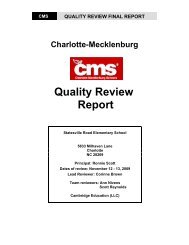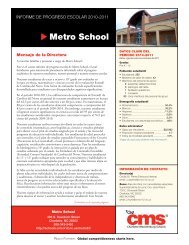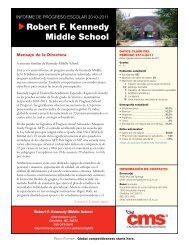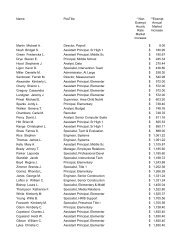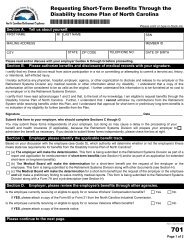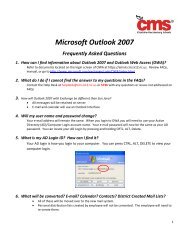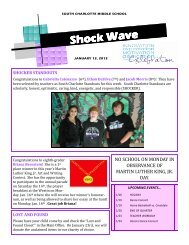SIP JT Williams MS 2010-11 - Charlotte-Mecklenburg Schools
SIP JT Williams MS 2010-11 - Charlotte-Mecklenburg Schools
SIP JT Williams MS 2010-11 - Charlotte-Mecklenburg Schools
Create successful ePaper yourself
Turn your PDF publications into a flip-book with our unique Google optimized e-Paper software.
the school system sponsored field trips, such as Discovery Place and The Museum of the New South, to expose our students to information and<br />
culture otherwise unavailable to them. We also sponsor additional trips such as a field trip to Raleigh N.C. and to Washington DC. Our AVID<br />
students visit college campuses to better understand the requirements of college entrance as well as visit college classrooms and observe<br />
college life. In addition to field trips, our school offers a variety of guest speakers who come to share with students their life experiences and<br />
educational hurdles. Guest speakers have included actor Will Smith, <strong>Charlotte</strong> broadcaster Sonya Gantt, author Dori Sanders, sports figure<br />
Sporty Jeralds and former C<strong>MS</strong> high school principal John Modest. Students have also experienced the Greek Festival, the Renaissance Festival,<br />
a visit to understand the careers involved with NASCAR and a trip to CPCC to participate in the “If I Had a Hammer” project.<br />
Utilizing our technology, we expose students to cultural and educational experiences around the world through the use of Promethean Boards,<br />
videos, as well as CD players. Students studying various aspects of science or social studies are able to see the concepts in action through<br />
technology devices, aiding in their understanding and ability to retain the information. Teachers are beginning to also use Discovery Education.<br />
3. How effective is the quality of teaching and instruction in ensuring high quality learning, progress and<br />
achievement?<br />
4 3 2 1<br />
High<br />
X Undeveloped<br />
Quality<br />
How do you know?<br />
Our students demonstrated progress on End-of-Grade math and science scores last year. During the 2008-09 school year, our school focused on<br />
integrating programs and instructional methods that were research based to be effective with students of poverty (READ 180, backward lesson<br />
design, ClassScape assessments, etc.). Our teachers collaboratively developed common assessments to ensure that students throughout the school<br />
were achieving and working toward mastery of objectives reflected on the End-of-Grade tests.<br />
Our school celebrated the beginning of a John Taylor <strong>Williams</strong> Middle School Beta Club in the 2008-2009 school year, celebrating the academic<br />
achievement of 76 students. These students demonstrated continuous academic excellence as well as positive character traits throughout the<br />
year. In addition, each quarter we celebrated the students who made the A, B or ABC Honor Roll with an awards program. Parents were invited to<br />
attend each program and recognition was given to students who maintained the Honor Roll from quarter to quarter.<br />
While test scores increased last year, the number of non-proficient students remains high (57 %). Teacher observation reports, Learning<br />
Community visits and administrative walk-throughs indicate that rigor is lacking in most classrooms at John Taylor <strong>Williams</strong>. In addition, the<br />
absence of higher-order thinking questions inhibits the quality level of the instruction, and subsequently the learning, of our students.<br />
Which are the strongest features of teaching and learning and why?<br />
Students are tested using the Scholastic Reading Inventory (SRI) to determine each student’s reading lexile level. Once levels were determined,<br />
students checked out books from the media center based on their individual lexile level and then completed activities in all elective classes based<br />
on these books. Because students were allowed to self-select books, interest in reading increased. Students are re-tested at the end of the school<br />
year to determine an ending lexile level. Teacher-developed Student Learning Objectives (SLO) last year were frequently based on an increase in<br />
10


